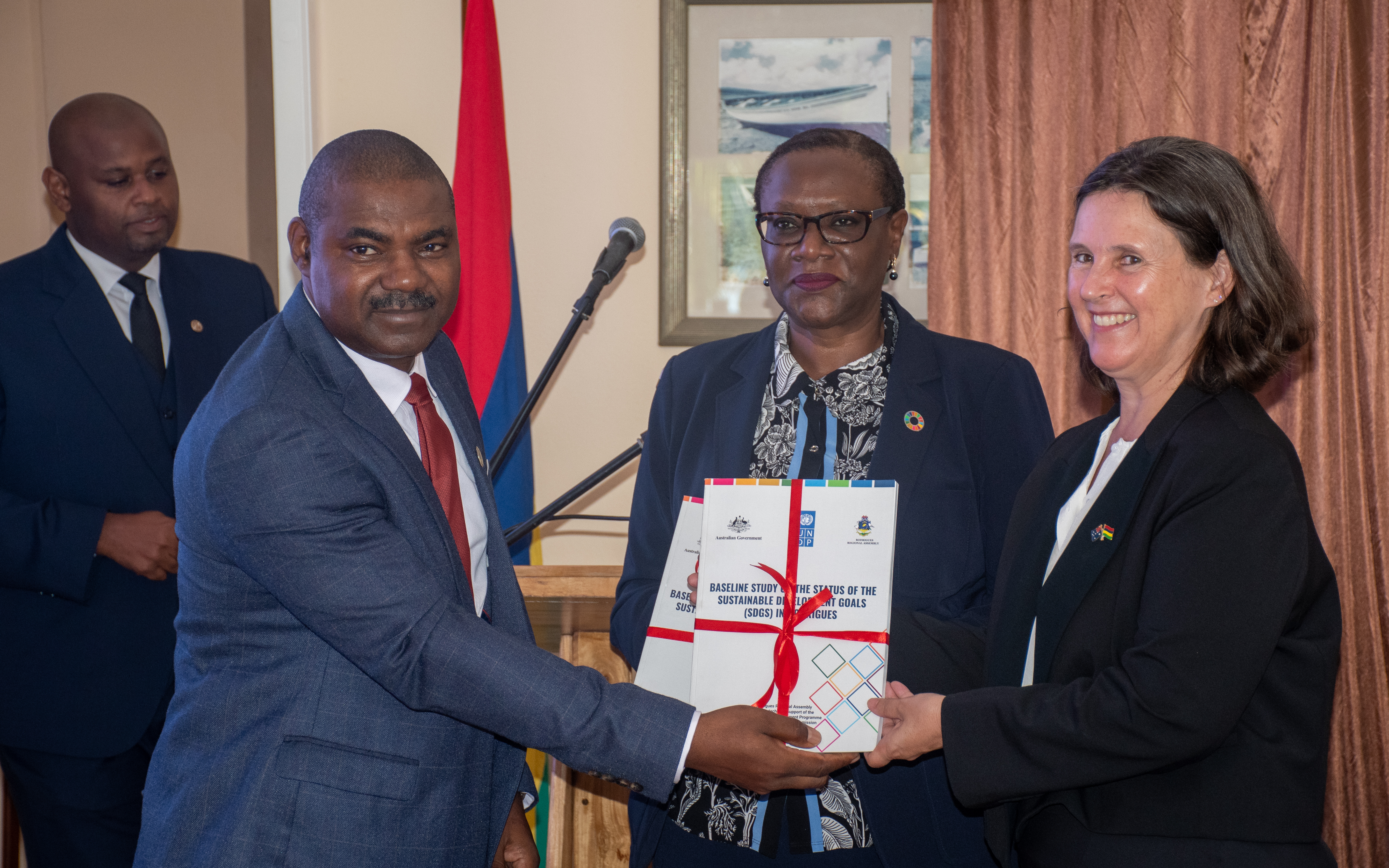The Updated Baseline Study Report on the Status of the SDGs in Rodrigues is part of the UNDP’s continuous commitment to enabling effective cross-sectoral collaboration in Rodrigues towards achieving the 2030 Agenda in partnership with the Australian Government.
Partnerships for the Goals: the Updated Baseline Study Report on the Status of Sustainable Development Goals in Rodrigues Officially Launched
August 18, 2023

The Chairperson of the Rodrigues Regional Assembly SDG Committee, Mr Mr Joseph Christian Léopold, presenting copies of the Baseline Study Report to Ms Amanda Serumaga, UNDP Resident Representative for Mauritius and Seychelles, and Ms Katrina Elizabeth Smith Lalor, Deputy High Commissioner of Australia.
The Updated Baseline Study Report on the Status of Sustainable Development Goals (SDGs) in Rodrigues was officially launched on Thursday 17 August 2023. The launching ceremony was attended by the Chief Commissioner of Rodrigues, members of the Rodrigues Regional Assembly and the SDG Committee, the UNDP Resident Representative and project team, the Deputy High Commissioner of the Australian High Commission, and representatives of the Rodrigues Youth Parliament and civil society.
Following the establishment of the Rodrigues SDG Committee, the first in the sub-region, the Updated Baseline Study Report on the Status of the SDGs in Rodrigues is part of the UNDP’s continuous commitment to enabling effective cross-sectoral collaboration in Rodrigues towards achieving the 2030 Agenda in partnership with the Australian Government. The drafting of the report was made possible by funding from the Australian High Commission through the Australian Direct Aid Programme. By establishing the existing infrastructures and mechanisms in place, the Study Report identifies the challenges faced by the island and informs the SDG Committee on the actions needed to steer Rodrigues closer to achieving the objectives of the 2030 Agenda for sustainable development.
Mr Johnson Roussety, the Chief Commissioner of Rodrigues, acknowledged the contribution of the UNDP and Australian High Commission in promoting sustainable development through this initiative. Recalling the specific characteristics of Rodrigues as an autonomous island of the Republic of Mauritius and the degradation ecological assets, the Chief Commissioner stated that the Study Report “will help promote sustainable development and provide opportunities for the economic empowerment of the population while ensuring that land and marine resources are managed and used through sustainable practices.”
Mr Joseph Christian Léopold, Chairperson of the Rodrigues Regional Assembly and Chairperson of the SDG Committee, noted that the Study Report will inform interventions beyond political party agendas and will also serve as a reference, make Rodrigues “an island of sustainable development champions”.
Ms Katrina Elizabeth Smith Lalor, Australian Deputy High Commissioner, recalled “bold reforms and sustainable development practices that the Rodrigues Regional Assembly have implemented” such as the ban of plastic bags on the island and the introduction of free books for secondary students. Ms Lalor reiterated the commitment of the Australian Government to collaboration with other states such as the Republic of Mauritius towards the realisation of the SDGs and the 2030 Agenda.
Ms Amanda Serumaga, UNDP Resident Representative for Mauritius and Seychelles, acknowledged the Rodrigues Regional Assembly’s commitment to evidence-based decision-making. “This can ensure that programmes being implemented serve the intended outcome to achieve the SDGs by redressing existing gaps; responding to the short and long term needs of the community; and levelling the playing field for different vulnerable groups for years to come,” she said. Ms Serumaga also commended the Government of Australia for supporting research to inform sustainable development interventions.
Some key recommendations for progress towards the 2030 Agenda highlighted in the Study Report include (i) enhancing local capacity for SDG advocacy and communications, (ii) enhancing the capacity of the Rodrigues Statistical Unit to improve data collection and statistics reporting, (iii) identifying SDG champions at community level, (iv) stakeholder mapping, and (v) calculating the GDP of Rodrigues.

 Locations
Locations





